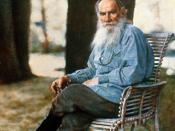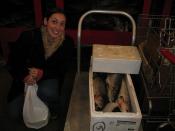In Leo Tolstoy's "Anna Karenina", the characters of Levin and Anna are devoured by their doubts and their inability to derive meaning from their lives. Their means of dealing with this existential doubt differ, however. Where Anna sees her life as a novel, a structured series of events that has form and in which she is in the hands of fate, Levin grapples with his inability to find any form at all to the disordered, and seemingly meaningless nature of his life which he nevertheless lives in a determined and resolute fashion. Tolstoy implies through Levin, that though we would like to attribute the qualities we ascribe to Art to our own lives, because they are comforting and fanciful, they are inappropriate and misleading. While the outlooks of these two characters differ, they resemble each other in their resolute truthfulness. As the protagonists of the book, their approaches in dealing with their fate are juxtaposed in their final inner monologues, the contrasting of which is the intent of this essay.
Tolstoy illustrates, through the destructive nature of Anna's act, and the elation experienced by Levin at his epiphany, the danger of ascribing poetic importance to one's own life. Conceiving of one's own life, as one looks at a narrative, fated by omens and external forces, is not only narcissistic and selfish, but untrue; whereas taking control of one's life to do good is noble and meaningful.
Anna's (and most young people's) ideology of life is that it is only truly lived when it is most intense. Tolstoy disagrees with this and confronts it with the idea that, in the words of Gary Morson, "life is lived in the small and ordinary moments." It is both "prosaic and undramatic" (Morson p. 73) at the same time. This is...


